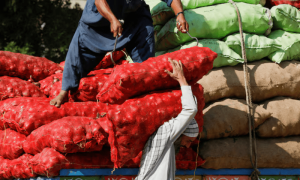
According to Pakistan Bureau of Statistics (PBS) data, palm oil imports surged to a new peak of 3.213 million tonnes ($3.4bn) in FY25, surpassing the previous record of 3.197m tonnes ($2.66bn) in FY21.
The average per-tonne price rose to $1,056 in FY25 from $927 in FY24.
Soybean oil imports also hit a new high at 321,107 tonnes ($344m) in FY25, compared to 119,845 tonnes ($129m) in FY24 and the previous record of 227,388 tonnes ($315m) in FY23. However, the average price per tonne dipped slightly to $1,070 from $1,081.
Import bill surges to $8.14bn in FY25, driven by palm oil, soybean oil, pulses and dried fruits
Local prices of edible oils remain high despite falling international prices. Sensitive Price Index (SPI) data shows national average prices of branded cooking oil ranging between Rs2,800-3,000 for five-litre packs, Rs1,425-1,485 for 2.5kg ghee packs, and Rs550-580 per kg for one kg pouches. In early July 2024, these were priced at Rs2,600-2,960, Rs1,175-1,310, and Rs470-513, respectively.
Pakistan Vanaspati Manufacturers Association (PVMA) Chairman Sheikh Umer Rehan attributed the high edible oil imports to growing demand for ghee and cooking oil due to the rising population.
The government has raised concerns over 29pc illegitimate profiteering in the edible oil and ghee market. During a recent Economic Coordination Committee (ECC) meeting, Finance Minister Muhammad Aurangzeb was informed that global edible oil prices had fallen by 24pc in recent weeks, yet local prices remained high. In some cases, prices increased by 4-5pc, reportedly due to weak regulatory oversight.
Officials noted that the local industry frequently engages in unfair practices due to insufficient regulation. Although the Ministry of Industries and Production assured the ECC of adequate national stocks, it acknowledged that international price relief had not been fully passed on to consumers. The ECC directed stricter monitoring and urged coordination among the Ministry, the Competition Commission of Pakistan, the National Price Monitoring Committee and provincial governments to address potential cartelisation and price manipulation.
However, Mr Rehan rejected the ECC’s findings, arguing that ghee and cooking oil prices fluctuate in line with international import prices and that the government’s interpretation of the industry’s practices was flawed.
Pulses
Pulses imports also reached historic levels. Full-year data shows imports at 1.464m tonnes ($1bn) in FY25 — up from 1.166m tonnes ($774m) in FY24 and surpassing the previous record of 1.315m tonnes ($946m) in FY23. The average per-tonne import price rose slightly to $694 in FY25 from $664 in FY24.
SPI data reflected mixed trends in domestic pulse prices over the past year. The price of masoor fell to Rs260–370 per kg from Rs290–400 in July 2024, while moong rose to Rs340-460 from Rs300-410. Mash prices declined to Rs400-530 from Rs500-640, while gram remained steady at Rs270–400.
The FY25 Economic Survey showed declining local pulse production. Gram production dropped by 16.6pc to 175,000 tonnes from 209,000 tonnes in FY24. Moong production fell to 131,000 tonnes from 153,000, while masoor and mash remained unchanged at 5,000 tonnes and 6,000 tonnes, respectively.
With annual demand for gram estimated at 700,000-900,000 tonnes, the country continues to rely heavily on imports — up to 700,000 tonnes annually — to bridge the supply gap.
Dried fruits and nuts
Dried fruits and nut imports also soared to an all-time high of 165,790 tonnes ($143m) in FY25, up from 102,566 tonnes ($71m) in FY24.
Dried fruits are widely consumed in traditional sweets and dishes, particularly around Islamic festivals such as Eidul Fitr and Rabi-ul-Awal, driving seasonal spikes in demand.